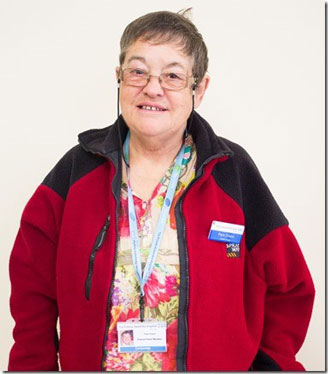How I relax and focus: Ways to unwind to help us stay well
We ask people about how they keep healthy and well, whether they have dementia or not. This time, we hear about ways to unwind and get perspective.

Pam Dixon, 76, Essex
I like reading daily for relaxation – it’s been a lifelong activity.
My favourite author is Alexander McCall Smith, in particular his books on the No 1 Ladies’ Detective Agency. It’s set in Botswana and I’m from Bulawayo in Zimbabwe, so it’s my part of the world.
As it is not possible to go to the library at the moment, I’m just reading anything I can get hold of!

Paul Harvey.
Paul Harvey, 49, Essex, with Lewy body dementia
I like to go fishing at the weekend – spending time on the bank, I can shut my brain down, take in my surroundings and enjoy nature. The friends I go with know my diagnosis, and the fishing lake people know as well, so they come and check on me.
When I gave up alcohol I got back into my fishing, and I try to go every weekend.
After fishing, my memory is good at the start of the week, then by the end of the week I just need to go fishing again.
I tried to find ways to relax after the lockdown started but found it hard as I used to look forward to the weekend.
Rebecca Agsakal, Derby
I joined a twice-weekly yoga class and I practise at home at least three times a week. I use the mindfulness element from the end of each session to help me sleep and relax.
I wanted to strengthen my core as I run and train regularly. I am more flexible. My sleep is of a better quality. I feel calmer in myself and more positive.

Susie Woodman with her dad.
Susie Woodman, 53, Hampshire
I do a daily meditation, usually in the morning and around 20 minutes long.
I will do it every day, regardless of how long I can commit to it. So even if it’s five minutes, it’s every day. I use an app called InsightTimer – you can set it to ‘ping’ or ‘bong’ at whatever time you want.
Being present is essentially what life is about, so practising this is fundamental to a life that flows.
I make sure my husband understands that I need the time and space to do it.
I feel more relaxed, with less stress and more perspective. I feel more in the flow of the universe – synchronicities happen more often when you’re present.
Susan Burns, England
I craft daily at home. It’s a release and distraction from the stresses of the day – I needed an outlet from my job, something that was not related to nursing. I also raise money for charities by selling my crafted items.
Stay well
Some things, like your age and genes, affect your chance of developing dementia but you can’t change them. Things you can change? Keep your mind and body active, enjoy healthier food, don’t smoke, drink less alcohol, stay in touch with people, and deal with any health problems.
If you already have dementia, the same things can help you to stay healthy and well – see our inspiration and tips to get active in ways that suit you.
NHS Live Well has health and wellbeing advice for everyone.
We need your help
We can’t keep our phone lines open or manage the increase in demand for our services without urgent financial support. Please donate today – with your help, we can show people living with dementia that they aren’t alone.


Carol
saysBelieve repercussions will go on for a long time after the worst of pandemics is over and we start to move about more. The day centre my husband used to attend is probably not going to re-open . Therefore , as a carer, I will also lose valuable respite time - my me time, which I valued so much.
Helen Evans
saysJust reading about how to cope with stress and anxiety, I share all the funny and touching social media posts with my husband. My friends send me funnies so we laugh a lot and there is no pressure to remember anything. I really believe that this is social media at its best